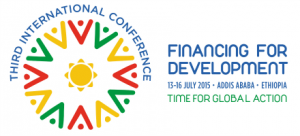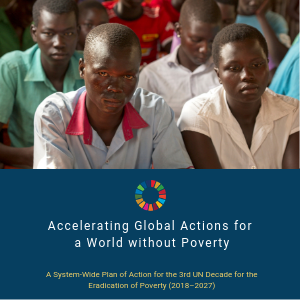Many people, especially women, still lack access to financial services, as well as financial literacy, which is a key for social inclusion.Financial access means access to a full suite of financial services, provided with quality, for everyone who can use financial services, thereby leading to an increase financial capability.
The Outcome Document adopted at the the Third International Conference on Financing for Development (Addis Ababa, Ethiopia, 13–16 July 2015) called for the establishment of a Technology Facilitation Mechanism to be launched at the UN summit for the adoption of the post-2015 development agenda. The Technology Facilitation Mechanism will be based on a multi-stakeholder collaboration between Member States, civil society, the private sector, the scientific community, United Nations entities and other stakeholders and will be composed of a United Nations inter-agency task team on science, technology and innovation for the sustainable development goals, a collaborative multi-stakeholder forum on science, technology and innovation for the sustainable development goals and an online platform called for a full and equal access to formal financial services for all. Member States will adopt or review their financial inclusion strategies, in consultation with relevant stakeholders, and will consider including financial inclusion as a policy objective in financial regulation, in accordance with national priorities and legislation.
Cooperatives through their microfinance services are able to reach the moderate, vulnerable and part of the extreme poor whereas the usual commercial banks would only be able to target the non-poor and wealthy clients. Financial institutions such as 7 cooperatives and credit unions thus offer comparative advantages through the provision of a variety of financial services that reaches members who are otherwise excluded from traditional loans and savings scheme such as the poor, people living in remote areas, indigenous people, women and youth.
Persons with disabilities continue to face exclusion and discrimination in their communities, including in areas of education, employment and healthcare. Evidence indeed indicates that the promotion of inclusive development for persons with disabilities is beneficial for all in development. In order to ensure inclusive and necessary support services for persons with disabililites (including social protection aimed at the full inclusion of persons with disabilities), it is important for the development agenda to recognize and include persons with disabilities in development. This includes adequately financing for disability-relevant services and support.
2.5 billion – more than half of the world’s working adults- are excluded from financial services. This is most acute among low-income populations in emerging and developing economies, where approximately 80% of poor people are excluded. Access to financial and social assets is a key contributing factor to help youth make their own economic decisions and escape poverty. Providing young people with financial services—whether a safe place to save or an appropriately structured loan for investment in an enterprise or education can promote entrepreneurship and asset building, and emphasize sustainable livelihoods. The financial component is especially effective for youth when complemented with training in entrepreneurship and financial literacy, and mentorship opportunities.
Resources
- Third International Conference on Financing for Development, 13-16 July 2015, Addis Ababa, Ethiopia
- Report of the Expert Group Meeting Harnessing the Cooperative Advantage to Build a Better World, 4-6 September 2012, Addis Ababa, Ethiopia
- Financing for Disability-Inclusive Development
- Financial Inclusion of Youth



Follow Us